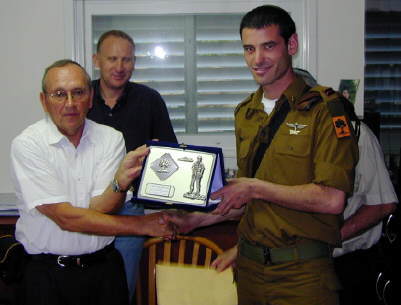|
It's not easy to
run a restaurant these days, considering the fact that many potential
customers have been scared off by security considerations, and many
other people aren't eating out much because of their difficult situation.
Even more difficult, of course, is the position of a soldier in an Israeli
combat unit.

Debbie Lampert, founder and CEO of eLuna.com, the Internet site on kosher
restaurants and associated products in Israel was well aware of the
desperate situation of many restaurateurs in Israel. "So many of
the restaurants I deal with are struggling," she says. The she,
in conjunction with an American Jewish community came up with a brainstorm.
What if donors
were to sponsor a good restaurant meal for the front-line soldiers?
That would help the restaurants themselves, boost the economy, and give
the soldiers a much-deserved lift.
The enterprising community who adopted this original idea was congregation
Shaaray Tefilah in North Miami Beach.
Says Debbie "Like many other Jewish communities, the members of
the congregation looked for a way to help Israel in these troubled times.
They were particularly moved by the story of Gedalya Mellick, a young
Golani soldier from the 51st brigade who was killed in the line of duty
during Operation Defense Shield, whom they had heard about because his
uncle is a rabbi in another congregation in Miami.
"They knew about eLuna through Israeli contacts and approached
me in an effort to find a way of funneling money into the economy. I
discussed the idea with my consultant Tal Frankel, who structure d the
idea into a program that involved the restaurants and memorialized Gedalya
Mellick."
Once the program had been formulated, members of Shaaray Tefilah adopted
the 51st Golani Brigade, and took the challenge of treating every soldier
in the brigade with their guest, to a restaurant meal. And although
the congregation is a small one, with some 200 families as members,
Shaaray Tefila raised the impressive sum of $10,000.
THAT'S just the beginning. Other congregations are now being encouraged
to adopt an army unit.
Says Debbie, "The contributors from Miami are in touch with the
synagogue in Seattle and I am also in touch with some potential donors
from the UK."
Eventually, she hopes, every soldier will be able to enjoy an expense-free
night out, courtesy of a caring community.
"The people who have contributed see it as a great program,"
she adds. "It seems to answer an American need. They feel a little
guilty that they're not here, but they still fell a sense of responsibility.
They want to help the soldiers. And there's a trickle-down effect. The
program brings business to suppliers and money into Israel's economy,
without being a charity donation.
DEBBIE has determined that nothing be second-rate in this program. That's
why she's vetoed the idea of meals held for groups of soldiers at one
time.
I know it works out cheaper for a restaurant to have a group of people
and offer them one standard menu, but the soldiers are entitled to the
best. I want them to be able to take their girlfriends to a restaurant
of their choice as a treat, and order whatever they want.
Soldiers will "spend" an average of NIS 200 on their restaurant
treat. Not only do the restaurant owners profit, says Debbie, but the
soldiers will bring a a certain security to the restaurants. Also, it's
nice for the restaurants to be full of young people.
The restaurants chosen are of a good standard, kosher (which is what
the donors specified) and located all around the country.
Debbie is involved as a service, which brings good will to her site.
In planning the project with the Florida community, she works with an
independent trustee, a representative from the IDF and an American representative.
ELUNA has been established now for three years, and in spite of hard
times it is holding its own. That is due in large part to Debbie's determination
and hard work.
"You have to work very hard in this market," says Debbie,
who lives in Ra'anana, and who admits that she doesn't eat out much
herself!
"The first year you build you product. After that you look for
revenue. The troubles caused to the restaurant trade by the Intifada
made us look for a new concept and regroup. We looked at it as a challenge."
Debbie consulted with Mesila, and organization in Ra'anana which helps
small businesses, and she was assigned a mentor, attorney Tal Frankel,
who helped her make the site profitable.
"It's made a difference," she says. "For instance, I
had a situation where some restaurateurs would advertise on the site
and then wouldn't have the money to pay for the advertising. Tal advised
me to let them pay in meal vouchers. So then, I had the problem of what
to do with the vouchers. I held on-site auctions, which turned the vouchers
into cash." Everyone was happy - the restaurateurs, who got advertising,
the clients, who got bargain meals through an auction, and Debbie, who
profited.
Tal also advised her that rather than approaching advertisers individually,
she should aim for year-long advertising agreements, which would build
inventory. The inventory, in turn, could be offered at good prices to
clients.
She is still positive about the restaurant trade in Israel, though she
notes that it is changing. "Restaurants in the center of the cities
are closing, but those on the periphery are opening up. We're seeing
a lot of restaurants and coffee shops in moshavim these days. People
feel safer off the beaten path.
|
|